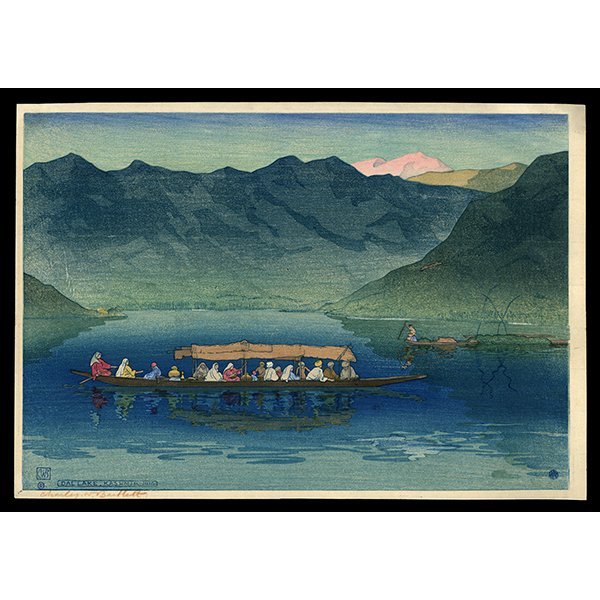<b>TAJ MAHAL FROM THE DESERT</b> / Charles Bartlett1919<b>SOLD</b></em>
ARTIST: Charles Bartlett (1869-1940)
TITLE: Taj Mahal from the Desert
MEDIUM: Woodblock
DATE: 1919
DIMENSIONS:11 3/8 x 16 1/4 inches
CONDITION: Excellent, no problems to note
LITERATURE: Honolulu Academy of Arts, A Printmaker in Paradise: The Art and Life of Charles Bartlett, pl. 12
SOLD
ARTIST: Charles Bartlett (1869-1940)
TITLE: Taj Mahal from the Desert
MEDIUM: Woodblock
DATE: 1919
DIMENSIONS:11 3/8 x 16 1/4 inches
CONDITION: Excellent, no problems to note
LITERATURE: Honolulu Academy of Arts, A Printmaker in Paradise: The Art and Life of Charles Bartlett, pl. 12
SOLD
ARTIST: Charles Bartlett (1869-1940)
TITLE: Taj Mahal from the Desert
MEDIUM: Woodblock
DATE: 1919
DIMENSIONS:11 3/8 x 16 1/4 inches
CONDITION: Excellent, no problems to note
LITERATURE: Honolulu Academy of Arts, A Printmaker in Paradise: The Art and Life of Charles Bartlett, pl. 12
SOLD
Details
Charles Bartlett was an English painter and printmaker who first traveled to Asia from 1913–1917. In 1915, Bartlett met the Japanese publisher and founder of Shin Hanga, Watanabe Shōzaburo. Shortly after their acquittance, Watanabe hired Bartlett to produce 21 woodblock print designs. Their collaboration resulted in a great success for Watanabe, who desired to revitalize woodblock print production in Edo-period Japan. Bartlett returned to Japan in 1919 and was hired once again by Watanabe to create an additional sixteen woodblock print designs.
Bartlett produced a diverse body of work for the founder of Shin Hanga, reflecting the artist’s extensive travels throughout Asia as well as his adopted home of Hawaii. Bartlett’s print designs added to Japanese prints’ subject matter and established the commercial viability for foreign, non-Japanese, scenes.
Rising above and set against a distance from the desert, the Taj Mahal emerges white and dreamlike. Bartlett made the quest to this exotic locale on his first trip to Asia. It’s no coincidence the caravan is positioned at the center of the composition. At the time of the artist’s visit, the sole means of accessing this remote location was via camel caravan, which took days, if not weeks, depending on the onset of one’s journey. One can only imagine the arduous trek required to set eyes on this site. Bartlett gives the viewer a glimpse of what the travel-weary voyagers must have seen as the ethereal white structure rose above the horizon, signaling the final approach of their quest.
Connoisseur's Note
This Bartlett design from 1919 is an exceedingly rare work. The great Kanto earthquake of 1923 destroyed the original Watanabe print shop and studio, including the printing blocks and unsold inventory for this design. Only impressions of this design sold before the earthquake and removed from Tokyo survived the earthquake and ensuing fires that consumed the city. This work’s desirability is further bolstered by the red crayon signature at the bottom margin as well as its excellent state of preservation, particularly the print’s lush and vivid colors.



